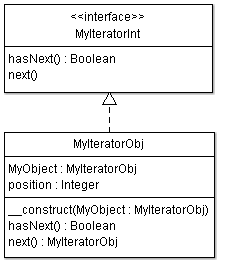Iterator
Date: 12 Jan 2009
We will use this pattern when we need a routine to loop through a collection of objects, these collections can be anything; an array of pure objects, resultsets from a database, etc. but we'll always need to know if next element exists and be able to retrieve it.
So, we have (See Figure 1):
- An interface that model the behaviour
- A class that will implements this behaviour, and there we can have all the iterators that we want: SQLIterator, FileIterator, AnythingIterator.
Sample code
error_reporting(E_ALL);
/**
* Script to demonstrate the Iterator pattern
*
* 12-Jan-2009
* @author freedelta, http://freedelta.free.fr
*/
/**
* Iterator - interface.MyIteratorInt.php
*
* Interface that models the Iterator behaviour
*/
interface MyIteratorInt
{
/**
* Asks if next element exists
*
* @return Boolean */
public function hasNext();
/** * It returns the object itself
* * @return Object */
public function next();
}
/**
* Iterator - class.MyIteratorObj.php *
* Class that implements the Iterator interface
*/
class MyIteratorObj implements MyIteratorInt
{
/**
* The object to be passed through the constructor parameter
*/
public $MyObject = null;
/**
* A pointer to the current position in the iterator
*/
public $position = null;
/**
* Initializes MyObject and position * @param MyIteratorObj MyObject: any tipe of object
* @throws Exception */
public function __construct($MyObject)
{
if(!isset($MyObject)) {
throw new Exception("Collection is empty!");
}
$this->MyObject=$MyObject;
$this->position=0;
}
/**
* Checks if next item exists
* @return Boolean
*/
public function hasNext()
{
// We are on the last item, or array is empty
if($this->position >= count($this->MyObject) || $this->MyObject[$this->position]==null)
{
return false;
} else {
return true;
}
}
/**
* This method is invoked only when we know that hasNext()==true
* @return Object MyIteratorObj */
public function next()
{
$item=$this->MyObject[$this->position]; // Get item
$this->position=$this->position+1; // Increment position
return $item; // Retrieve item
}
public function __destruct()
{
}
}
/** * Iterator - class.Person.php
* * Object to test the Iterator pattern */
class Person
{
protected $name=null;
public function __construct($name)
{
$this->name=$name;
}
public function getName()
{
return "My name is: ".$this->name;
}
}
// Sample use
// Instantiate Persons
$MyObject=array();
$MyObject[0]=new Person("Peter");
$MyObject[1]=new Person("Paul");
$MyObject[2]=new Person("Me");
try
{
// Send array of Persons to the Iterator
$iterator=new MyIteratorObj($MyObject);
while($iterator->hasNext())
{
$currentItem=$iterator->next();
print " ". $currentItem->getName();
}
}
catch(Exception $e)
{
var_dump($e); }
The output will be:
My name is: Peter
My name is: Paul
My name is: Me

